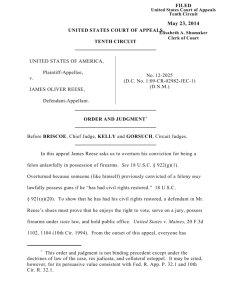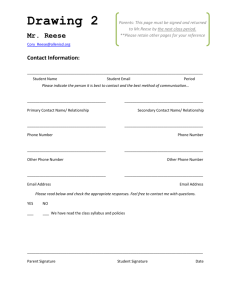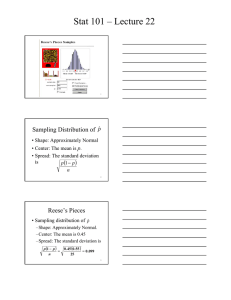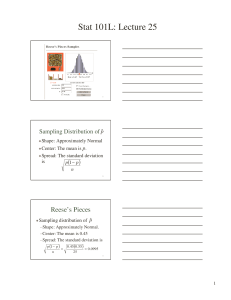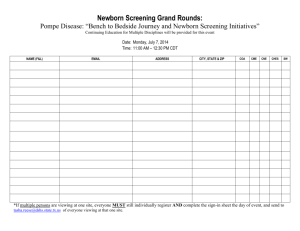Smith College Alumnae Oral History Project
advertisement
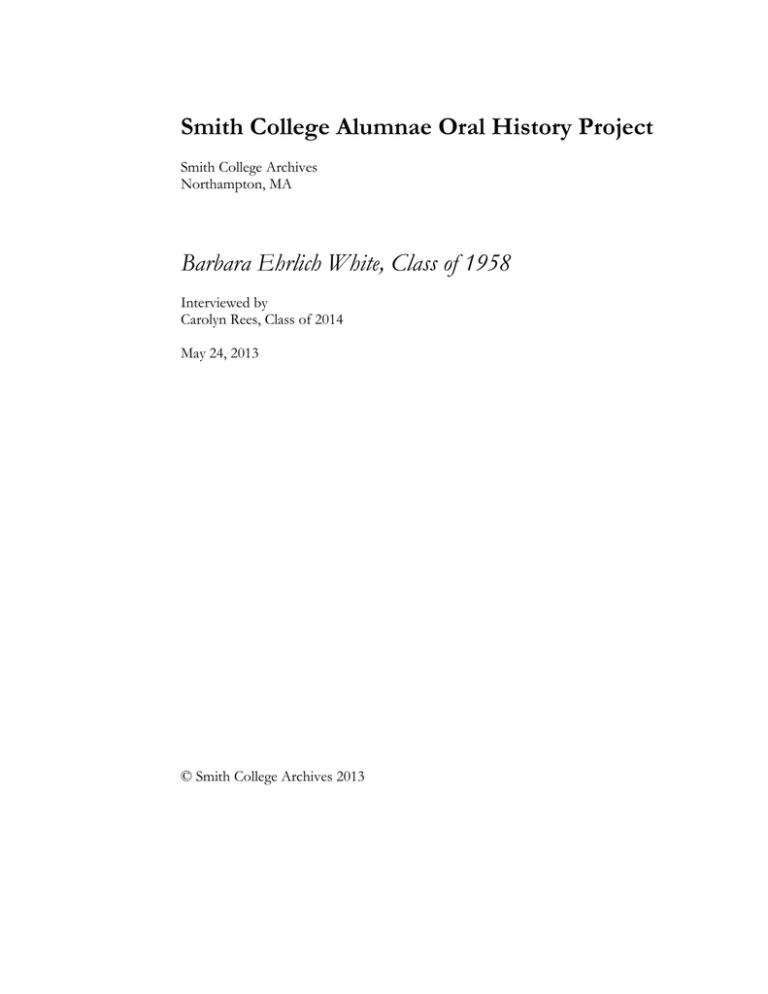
Smith College Alumnae Oral History Project Smith College Archives Northampton, MA Barbara Ehrlich White, Class of 1958 Interviewed by Carolyn Rees, Class of 2014 May 24, 2013 © Smith College Archives 2013 Abstract In this oral history, Barbara Ehrlich White discusses her view of reunions as markers in our life journey. She looks back on her Smith experience and reflects on the importance of her junior year in Paris in preparing her for her career as an art history professor and author. She credits her Smith training in art history as foundational for her later success. Restrictions ONLY OPEN TO THE SMITH COLLEGE COMMUNITY/NO ONLINE ACCESS Format Interview recorded on miniDV tapes using a Panasonic DVX-100A camera. One 30-minute tape. Transcript Transcribed by Janet Harris with Harris Reporting. Bibliography and Footnote Citation Forms Video Recording Bibliography: White, Barbara Ehrlich. Interview by Carolyn Rees. Video recording, May 24, 2013. Smith College Alumnae Oral History Project, Smith College Archives. Footnote: Barbara Ehrlich White, interview by Carolyn Rees, transcript of video recording, May 24, 2013, Smith College Alumnae Oral History Project, Smith College Archives. Transcript Bibliography: White, Barbara Ehrlich. Interview by Carolyn Rees. Transcript of video recording, May 24, 2013. Smith College Alumnae Oral History Project, Smith College Archives. Footnote: Barbara Ehrlich White, interview by Carolyn Rees, transcript of video recording, May 24, 2013, Smith College Alumnae Oral History Project, Smith College Archives, p. 3. Barbara Ehrlich White, interviewed by Carolyn Reese 1 Smith College Alumnae Oral History Project Smith College Archives Northampton, MA Transcript of interview conducted May 24, 2013, with: BARBARA EHRLICH WHITE by: CAROLYN REESE REESE: We're rolling. This is Carolyn Reese and I am conducting an interview with Barbara Ehrlich White on May 24, 2013 for the Smith College Alumnae Oral History Project. So thank you for being here and agreeing to participate. Why are you attending reunion this year? What brings you back? WHITE: I think I started coming – maybe I did the 25th, maybe the 35th, 45th, 50th, 55th. I suppose it's a way of keeping track of one's life. REESE: Right. WHITE: It's a marker, you know, that I'm still around, lucky me, that there is 100 people who've died. And I think we were around 600 in our class, so if there's 100 who died, then there's 500 lucky ones and I'm one of the lucky ones. REESE: Huh. WHITE: And I supposed I’m – I don't know. I believe in keeping a track of what you're doing with your life and having markers and, you know, like we celebrate anniversaries. You know, we try to respect markers to make one aware because otherwise life slips by and one doesn't realize the passage of time, so it's nice to come back. REESE: Uh-huh. Are a lot of your friends and classmates back this year? WHITE: My – really, the woman I was closest with, I really don't understand, but she had some problems and she never comes back and she doesn't keep up with her friends and things. So I never understood what happened there, but there were some big problems. Other people, a very close friend is here with her husband and that's one of the reasons we're here. Our junior year in Paris and surprising most of the girls then went to Dawes House, the French house which was so wonderful, my favorite house. And I loved that house, but I am the only person from Dawes House in my class which means the other girls from junior year in Paris who went to Dawes House – REESE: Right. Smith College Alumnae Oral History Project Smith College Archives Barbara Ehrlich White, interviewed by Carolyn Reese 2 WHITE: – didn't come because it's just me. And this other girl that I'm very close, she was junior year in Paris, but she went to Wallace, so she went back to that house. REESE: Oh, okay. WHITE: So of all of the people in my house, I'm the only one that came, but I'm glad to be here. REESE: Good, good. So, how did you choose to attend Smith? WHITE: I suppose I applied to Radcliffe and I was on the waiting list. I think that was my first choice. And I applied to Wellesley and I was on the waiting list. Maybe that was my second choice. And I applied to Smith and I got in and I waited on the waiting list of the other places. And I reapplied to Harvard twice, but, you know, in those days there were 100 women at Radcliffe to 1,000 men at Harvard. It was very hard. REESE: Yeah. WHITE: So, unfortunately I didn't make it, so I came to Smith by default. REESE: Uh-huh. Uh-huh. So, what were your first few days at Smith like? What were you feeling upon arrival? WHITE: Well, I suppose that there were no boys, which was, from my perspective, a big mistake. I should have gone to a co-ed school because, I don't know. I just always felt there should have been men here and I was more comfortable in an environment with men. REESE: Uh-huh. WHITE: So it was sort of I felt like I was a fish out of water. That's one of the reasons I adored my junior year in Paris, that there were men. It was just like I just sort of – I'm a college professor. I teach at Tufts. I believe in co-ed education. REESE: Uh-huh. WHITE: I mean I don't – I think single sex high school is a very good idea, you know. That's nice, single sex high school, but college, for my temperament and as a professor I loved having boys in my class. And the girls talked as much or more than the boys. The girls were as leader as the boys. I didn't see any – so I don't really believe in single sex education personally. Even though I support Smith, you know, I give my money, but I do not – I think single sex, I don't – it's certainly not for me and the people like me. Maybe there are pockets of the population that it's good for. Smith College Alumnae Oral History Project Smith College Archives Barbara Ehrlich White, interviewed by Carolyn Reese 3 REESE: So what was your junior year abroad like? WHITE: Fabulous. Oh, Paris was fabulous. And I'm a professor of art history now, so French – and I write books on Impressionism. I write books on Renoir. I'm completing my fourth book. REESE: Okay. WHITE: So French and art history are my loves. REESE: Yeah. WHITE: And so – REESE: No better place. WHITE: It's fabulous. I mean Smith did have a very nice art department. It was very nice. And I, coming from Smith, I was able to get a Ph.D., both a maters and a Ph.D. from the Einstein of Art History at Columbia, so I think it was thanks to the good training here. In the masters program, he weeded out people and not a lot of people go their masters with him that he wouldn't allow to continue. So I think my art history, I had wonderful teachers here in art history. They had really first rate people here: the Lehmans (phonetic), the Kennedys, the – I mean really first rate art history, and so that I'm very indebted to Smith for junior year abroad and for the art history department. It was wonderful. REESE: Uh-huh. So, how did you decide on your major? WHITE: I always got straight A's with no effort whatsoever, no struggle. It was just like – REESE: No struggle. WHITE: It was just like I just loved it. REESE: Right. WHITE: It was sort of not a choice. It chose me sort of. REESE: Uh-huh. Uh-huh. WHITE: Pretty easy. REESE: So how did your junior year abroad in Paris influence the rest of your Smith career? WHITE: Well, because I was lucky enough to have Dawes House so I could speak French Smith College Alumnae Oral History Project Smith College Archives Barbara Ehrlich White, interviewed by Carolyn Reese 4 and was with people who had been to Paris, so it was great. It was very nice. REESE: Yeah. WHITE: Yeah. REESE: What were some of your favorite or most memorable classes? WHITE: Art history. I loved the art history. I mean I remember the classes. There was this wonderful Italian Renaissance class. And, you know, we're talking so far back when, God, you know, I was a professor of art history at Tufts from – I started teaching art history at Queens College in 19 – a year after I graduated from here I started teaching art history at Queens College and then at Tufts. And the – I mean these weren't Xerox machines. There was like nothing. But I remember here they used to have beautiful photographs, black and white photographs that you could study. And, you know, everything was very primitive, you know, but it was great. I mean it's what everybody did. You didn't know the quick things of doing everything nowadays, but, you know, you typed a bibliography, you made a mistake, you typed it again and you typed it again. You know, everything was very slow and belabored compared to now. REESE: Right. WHITE: But it worked. It's better now. I mean all the modern technology enables you to edit and to, you know, everything is so quick and so accessible. It's really wonderful. But it worked the other way in a slow, belabored way. REESE: Right, right. What house did you live in before Dawes? WHITE: Well, first I started in Lower Scales. REESE: Okay. WHITE: And I wasn't very happy there. So then I tried Chapin and I wasn't very happy there. Then I went junior year abroad and then I went to Dawes. And I was very happy there. REESE: Uh-huh. Uh-huh. WHITE: I think again the environment with no men just bothered me. REESE: Right. WHITE: Fundamentally bothered me. I just – I could never adjust. I had gone to all girls camp and I hated it, so I don't understand why I even applied to an all girls school. I mean, you know, I just don't – something in my background made me more Smith College Alumnae Oral History Project Smith College Archives Barbara Ehrlich White, interviewed by Carolyn Reese 5 comfortable with men around. REESE: Right. Right. WHITE: So that's just me, so. REESE: And what was the dating culture like at Smith during your tenure? WHITE: Terrible, pretty terrible. It was terrible. I don't think I ever met anybody here ever. REESE: Uh-huh.. WHITE: I had boyfriends. I'm from Great Neck and I had boyfriends from Great Neck and I knew boys in New York. REESE: Right. WHITE: But I never met a soul here ever. And I'm Jewish. There were no Jewish anything, so there was no Hillel. There was no nothing. REESE: Right. Right. WHITE: It was just like tough luck, you're on your own. That was it. So luckily, so I went back to Great Neck and I went to boys I knew in Columbia. And I knew boys at Harvard. REESE: Yeah. WHITE: But I knew them from before. I never met anybody through Smith ever. So it was just like y ou're on your own. Good luck to you. And there was no therapy. If you have psychological problems, there was nobody. I mean it was like you were in a wasteland up here. There really was no one to talk to. The head MD, I mean I had some issues and the head MD, I was anorexic. I weighed 89 pounds, not that I weigh that much more now. I weigh only 2 pounds more now. But anyway, I was anorexic and people were worried about me. And so I had to have – go and have milk and cookies every day, but the head doctor was a very sweet old lady. And she wanted to talk to me and she insisted that I come and talk to her. I suppose they were just worried I would just not eat or whatever. So they were caring for me. They were. But there was no way you could get therapy here, I mean in any sophisticated way. REESE: Right. WHITE: There was nothing up here. Because an uncle of mine was a psychoanalyst in New York and very well connected. The nearest somebody he could find for me Smith College Alumnae Oral History Project Smith College Archives Barbara Ehrlich White, interviewed by Carolyn Reese 6 was in Springfield. How was I going to get to Springfield, you know? REESE: Yeah. WHITE: So it was like it was only after some girls committed suicide in my – I remember one year three girls committed suicide, one girl from my house who hung herself because she was pregnant. There were three girls who committed suicide and they finally said, "Hey, we better get some therapists up here." So, but by the time they did, I had left. REESE: You had graduated? WHITE: Yeah. REESE: Oh, okay. WHITE: Might not be true. I think there was a therapist, a very sweet woman that I remember. So I used to see the first two years probably because of the anorexia, they wanted me to see the head MD. REESE: Right. WHITE: But then after the suicides there was a therapist. And I even can start remembering her name, a sweet woman. And I remember I used to talk with her. REESE: Okay. And what year did the suicides happen? WHITE: Well, I graduated in '58, so if there was a – they got their first therapist, and I could be wrong, in the '57, '58 year, so the suicides must have been prior to that. REESE: Right. WHITE: There were several. I remember one year where there were three suicides. REESE: When you were at Smith? WHITE: Yeah. REESE: And what was the – WHITE: They got pregnant at Dartmouth and the thing was big. They were all pregnant. So it was something about rather die than admit you're pregnant or whatever. I don't know. But it was horrible. REESE: And what was the campus response? Smith College Alumnae Oral History Project Smith College Archives Barbara Ehrlich White, interviewed by Carolyn Reese 7 WHITE: It was hush-hush. REESE: Or what was the student – WHITE: No one would discuss it. REESE: Right. Right. WHITE: It was like just sweep it under the rug and maybe it didn't happen. REESE: Right. So junior year abroad really came at a good time for you. WHITE: Yeah. Right. Yeah. REESE: Yeah. And really like defined the – WHITE: It was a wonderful thing. REESE: That's good, good. WHITE: And then for my future career – REESE: Absolutely. WHITE: – it was wonderful. REESE: Yeah, yeah. WHITE: Super. REESE: That's great. So how would you describe a typical Smithie during your time at Smith? WHITE: Well, a very conformist person which I'm not at all. I'm the polar opposite of conformist. They wear the same things, Bermuda shorts. I mean, you know, it was like my father was president of an advertising agency on Madison Avenue, and I sure wasn't going to jump to be the kind of people that he portrayed, that he scorned. So, no thanks. In other words, his pitch and everybody's running along, but he thought – didn't think much of people that followed his pitch. So I couldn't buy into what he was – the whole thing. So, sure, there was a uniform, Bermuda shorts and long socks and loafers and whatever. Camel hair coat, whatever. But it just didn't feel like me at all. REESE: Right. So how did you find a space to be your non-conforming self? WHITE: I always have and I, you know. Smith College Alumnae Oral History Project Smith College Archives Barbara Ehrlich White, interviewed by Carolyn Reese 8 REESE: Right. WHITE: I'm sort of a sociable loner. You know, I'm just that way. That's the way I've always been and that's fine. It works. The students like me, so. REESE: Yeah, absolutely. WHITE: I can do my work. It's fine. REESE: Yeah. And so you talked about how they didn't have Hillel when you were here. WHITE: No, I don't remember. Never introduced, no mixes, no nothing. REESE: Right, no mixing. WHITE: Good luck to you, you know. REESE: Yeah. WHITE: I mean and you're in this isolated place. Nowhere no boys. REESE: Right. WHITE: It's ridiculous. REESE: Right. Right. WHITE: Totally ridiculous. REESE: Were there other resources for Jewish students? WHITE: None that I knew of. REESE: Did you meet other Jewish students? WHITE: Yeah. Oh, yeah, because there were Jewish students, sure. REESE: Right, absolutely. WHITE: Yeah. For sure, yeah. Probably a quarter of the class was Jewish probably. REESE: Uh-huh. Uh-huh.. And was there any tension or – WHITE: No. REESE: No. Just not – Smith College Alumnae Oral History Project Smith College Archives Barbara Ehrlich White, interviewed by Carolyn Reese 9 WHITE: But in those days being Jewish was not – you know, it's nothing you were bragging about. This was after the war. We're talking about in the fifties, so. REESE: Yeah. WHITE: You know, there might have been a rabbi or something, but I have no recollection of ever going to anything or – REESE: Right. WHITE: – you know, there were no. REESE: Were there any like hot topics on campus during your time here or like hot issues or controversies that happened? WHITE: We were not – it's not in the sixties. This is the fifties. REESE: Right. WHITE: You know, I think it was the time of the Korean War. This is not Vietnam. This is before. You know, the big thing was to get engaged in your junior year and to get married immediately after you graduate. REESE: Uh-huh.. WHITE: So you were supposed to get the diamond ring junior year so you're just – or you're either going to be pinned. Maybe sophomore year you're pinned and then you get your diamond ring junior year. And then senior year, as soon as you get your diploma, you get married and then you have a baby and that's it. You sail off into the stars. That was the formula that a lot of people did and that was considered wonderful, so. REESE: Right. Right. WHITE: I never bought it for one second. Over my dead body. I'll tell you that one. I would rather be single than do that – REESE: Right. WHITE: – song and dance, but because I just – again, my father was president of an advertising agency on Madison Avenue who scorned society. In other words, what he was manipulating, he disparaged. So I couldn't buy that. You know, it was like he made fun of what he was promoting. So I could see through what he was promoting, but I didn't have any alternative but just to be a loner on my own and do my own thing and just not buy. In other words, he was mocking the general culture that he was part of pushing it. Smith College Alumnae Oral History Project Smith College Archives Barbara Ehrlich White, interviewed by Carolyn Reese 10 REESE: Right. WHITE: So – REESE: And it sounds like the culture at Smith at the time was very much buying into – WHITE: Right. REESE: – that image. WHITE: Oh, yeah. Right. It's hard not to. REESE: Yeah. WHITE: It's hard because most people, you know, they weren't burned to what it's all about, you know. REESE: Uh-huh. Uh-huh. WHITE: You know, like my father used to say, "You know, put a sexy woman in front of a car. They'll buy it." You know, he's say, "You can fill cans with shit. People buy it." I mean he was very mean and I mean like why he would go into a profession that he realized was so manipulative and that had such a low view of the public beats me, but he made me into a very questioning outsider because I couldn't buy into the thing that he didn't approve of. I mean I was the only – the only way was to be an outsider and just not buy. REESE: Uh-huh. Uh-huh. WHITE: But that was the only way. REESE: Yeah. That sounds very difficult. WHITE: Yeah. REESE: So how did Smith prepare you for the world after gradation or did it? WHITE: All the ways that I've told you. Smith didn't. I did. REESE: Right. WHITE: Because I was not a Smithie. I was an outsider, so I just – I've always been an outsider. It's been just fine. REESE: Uh-huh. Smith College Alumnae Oral History Project Smith College Archives Barbara Ehrlich White, interviewed by Carolyn Reese 11 WHITE: And I'm married. I have two kids. My fourth book I'm just finishing. You know, it's fine. I do my own thing. But I'm not a joiner, never have been because I suppose my father made such mocking of buying into stuff. You know, being gullible and being a joiner was looked on, so I didn't have much choice of trusting the system, you know. I didn't trust the system, so I just did my own thing. REESE: Right. WHITE: Surely I'm sure lonely because of it, but I mean I had friends. I always have friends, but I've just – it's a different mentality. REESE: So what did you go on to do after leaving Smith? What path did your life take? WHITE: Well, I just marched right ahead and I got a masters and I started teaching at Queens College one year after being here. Then I got a Ph.D. from Meyer Shapiro which is wonderful and the best training, fantastic training. Then I taught at Tufts from 1965 and I became emeritus in 2002. And I write books and have students and it's been just great. It's been very hard work. I mean I work extraordinarily hard, long, long, long hours. You have to be very obsessive. REESE: Uh-huh. WHITE: But I enjoy it. REESE: Good. WHITE: You know, it's not fun and games, but it's intellectually marvelous. REESE: Uh-huh. WHITE: And it's terrific. I was just nominated a (indiscernible) of arts and letters by the French government. REESE: Wow. Congratulations. WHITE: I don't have it. I mean I was nominated and I got three recommendations of which one person sent it. It was pretty nice. But I might get it. REESE: Yeah. WHITE: I mean I don't know if everybody who's nominated and gets references gets it. I don't know that, but. REESE: Uh-huh. That's very exciting though. Congratulations. WHITE: Yeah, it's very exciting. Smith College Alumnae Oral History Project Smith College Archives Barbara Ehrlich White, interviewed by Carolyn Reese 12 REESE: Yeah. Yeah. WHITE: So – REESE: Well, I hope you get it. WHITE: Yeah, let's hope so. REESE: I'll be thinking of you. WHITE: I hope so, yeah. At least I know I was nominated. REESE: Yeah, exactly. Nomination means a lot. WHITE: It does. REESE: Let's see. WHITE: That's nice. All right. All I can say is, you know, you have to work. Renoir, I do books on Renoir and impressionism. REESE: Right. WHITE: So Renoir is my role model for a lot of things. He was a person with a very difficult life. He had thirty years of poverty and then he had thirty years of progressive rheumatoid arthritis and he paints sensual, beautiful paintings. And he's very, you know, nothing is going to stop him. He breaks his right arm. Then he paints with his left arm and he breaks it. You know, nothing is going to stop him. Nobody is going to stop him. In other words, his work comes first and he comes second. And he's amazing. And, you know, he's not anti-Semitic. My book with prove that. And he's not anti-women fulfilling themselves. It's not true. You know, I'm writing a biography based on 3,000 letters. REESE: Wow. WHITE: Because I'm called Mrs. Renoir. I have the largest collection of Renoir letters in the world. REESE: Really? WHITE: But I believe his values are my values of hard work, being obsessed by work, loving work, being passionate, involvement in something. And so he's sort of my role model of because work gives you pleasure. In life, you never know what's going to come along. But he had lots of friends. He was very outgoing, generous, a very nice person, very complicated, sneaky, oh, and secrets and a lot of stuff, but basically a very good person, a good person about a lot of stuff. So it's been a Smith College Alumnae Oral History Project Smith College Archives Barbara Ehrlich White, interviewed by Carolyn Reese 13 treat to work on him for my life. REESE: Yeah, absolutely. WHITE: I will continue doing it after I publish this book. One thing I envision doing, and I have 3,000 letters, the biggest archive in the world. I might create an archive on the internet for future scholars to where I put all of my archives which are world renowned really on the archive for future because after I die, who's going to have my archives? But if I put it all on the internet, a big Renoir archive, because everything is public domain now. REESE: Uh-huh. WHITE: So that's what I want to do after this book is publish and everything, is work on my archives for future scholars. That would be nice. REESE: Yeah. WHITE: A very nice gift because people have been so nice to me, the family, one of my references, the family, and so many people in France and in America have been so good to me through the years, amazing. So my way of giving back are these books, but also my archive to all the letters. And I might even scan – I have thousands of photographs. I mean everything could be scanned. So I want to put everything available for future scholars. That would be nice. REESE: That would be really incredible. WHITE: Yeah. That's what I'll do after I finish this – I've finished the book. I just have to do the notes. REESE: Right. WHITE: A few, you know, it will take me another year or so, but then I'll just work on the archive. REESE: Yeah. WHITE: That would be nice. REESE: That would be really interesting. WHITE: And I work with students. I always have student helpers who I adore and they adore me and it's wonderful. REESE: Uh-huh. Smith College Alumnae Oral History Project Smith College Archives Barbara Ehrlich White, interviewed by Carolyn Reese 14 WHITE: Kids are great. So that's – that keeps me going too. REESE: Absolutely. Well, I only have a few minutes left. Do you have any advice for current and future students of Smith? WHITE: Just look within. Find out what is good for you. You are the only one who knows what's right for you. Nobody else knows. And you've got to figure it out. And don't – you know, if you don't think something is right, don't do it. If you don't think someone's right, don't marry them. You know, just be very careful that it's right for you. Otherwise, don't. REESE: Yeah. WHITE: So, you know, your job should be something you love or keep looking. The person you be with should feel right. If it doesn't, don't. Don't belief media, bullshit around. It's, you know, one size fits one. You know, you've got to create your own. Everybody's got their own tale. You've got to find out what turns you on and go for it. That's it. Nobody's advice is going to help you. Just what feels right to you, what feels honest to you, what feels good to you, what feels kind to you, what feels generous to you. It's only you who know. You know, you'll know if you're doing the right thing or not. REESE: Uh-huh. Great. WHITE: Yeah. REESE: Well, thank you for – WHITE: You're welcome. REESE: – sharing your experience and your story. I'm glad that you're here. WHITE: Yeah. END OF INTERVIEW Transcribed by Janet Harris, July 2013. Smith College Alumnae Oral History Project Smith College Archives

